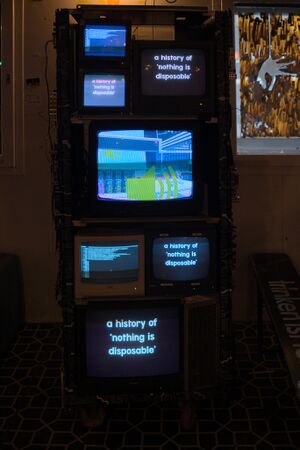User:Lor.ensō/XPUB1/SI22
SI22 -> Graveyard - > Questionnairerasure / protocols for passive hoarding / Marie KonDON'T -> ByteNoise: Sound You See Me, Sound You Don't
THE GRAVEYARD METAPHOR
When we were working in the WordHole and thinking about metaphors for the archive.
The state of grief influenced me about how to deal with an archive. We were talking talking about ways to work with amounts of data and my Metaphor came about a graveyard as an 'archive' with the 'datasets' on the stones. The idea was about having a place where we could 'bury' the files that were not used in order to give some honour to the effort concerning the making of the radio worm.
I said in my recording that at some point you just need to let it go because it's not coming back. The things that would be thrown away in the recycle bin folder, were still on the hard drive.
A proposition I made back then was "maybe we just leave it as is and just delete them and have a radio memorial service as a last salute rather than saving it for maybe later purposes without knowing when or if it would be used."
And I was clearly stating it as NOT Marie Kondo'ing it but just for the sake of cleaning up > maintenance.
Cleaning out the space, what is important?
Active archiving -> the 'worm' goes into the ground and there is stuff everywhere but 'worm' just goes where there is food. All the other things in the ground are dissolving and rotting away anyway.
To look at the idea of do we need this later, No.
during a methods class with Steve, we were doing an exercise that was about 'free for all typing' considering our thoughts on the special issue in order to create a narrative (from what I can still remember). It became a poem that with the format of the codeblock presented as some sort of net-poem.
<i> Questionnairerasure
Are worm a space a radio and a place and more
I listen in / to worm
I go out I listen I read and I archive. Through the pipeline |
can’t keep anything that is clutter but need to keep the importance and dance.
not the snake, am the wormoborous the community that feeds on ourshelves.
Leave the archive as to what is important rather than imported. leave files
And will come around and eat the cookies the crumbs lost. !important
Use the space for the next to continuity in unity of the worm
Prepare for leaving but never for farewell. Say goodbye to what you usen’t.
Is het kunst of kan het weg?
meaning
Is it art or can it be thrown in the trash
Can we empty the bin
In order to begin where our wormhole left us
If moved from here to there to then from now
What is taken
What is taken into consideration
In what state is the open city, In which state lies it and how do you leave it
The space as the wormhole through the wordhole takes us into the active archivalry.
The physicality contradicts the practicality, being pragmatic of fragments
Being pragmatic over the roots of the space into the data trees
What can be erased? In order to digest, what is there
It should be clear, or cleared or ´klaar´ which means done
You can store it elsewhere but that isn’t viable over the long run, worms don’t run, they crawl and feed on what is there.
This is no calling for to be sterile or a vote for marie kondo, please kondon’t, but only the wormunity can understand what needs to be kept
Who are the worms, do they want to keep everything?
Are they capable of leaving recordings behind?
Is it a doom scenario to delete stuff to remain active in archive
Or does cluttering / hoarding / keeping storage in servers and clouds fit the idea or the worm
Will the worm be worn out because of the ecological ideas of the worm
The worm can’t proceed while being stuck, the worm needs to crawl in order to move, to breathe through the space, how does the worm think of using the space,
How do you conserve if conservation can harm the soil, maybe digging a bit too deep in these old gardened graveyards but if we wish to make an apocalyptic doomsday protocol, we must show tough love about the institution of the open city. How do we maintain traffic in a city if the city is blocked and clogged?
Making the worm accessible and open implies that space is made. In what order does the worm make space for achieving an active archive rather than proceeding as the hoarding worm.
Consider this an open call for an open city, an open space for an open mind where questions are open food for thought that the worm can digest again and let its excrements be dissolved in the past. </i>
This poem then lead as on of the backbones to
Byte Noise: Sound you see me? Sound you don't (w/ Senka)
Lorenzo's Wiki Entry
Description of work: These 3D renditions of the Radio Worm studio contrast the empty studio with all the invisible audio data, the endless stream of radio shows, stored on Worm's hard drive. Since this is the most important space for the community of radio makers, we created this snapshot of it while thinking about the question 'What do we do with all this invisible digital data and how do we prevent it from getting "dusty"?'







